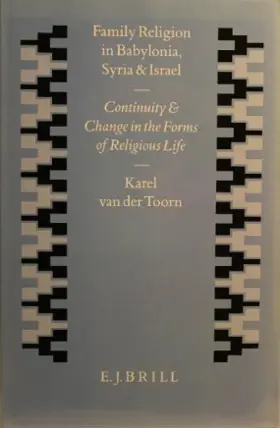

Family Religion in Babylonia, Syria and Israel: Continuity and Change in the Forms of Religious Life (Studies in the History and Culture of the Ancient Near East, Vol 7)
Pages
491
Publisher
Brill
Published
3/1/1996
ISBN-13
9789004104105
This volume deals with the religious practices of the family in the ancient Babylonian, Syrian, and Israelite civilizations. On the basis of a wealth of documents from both the private and the literary realm, the book gives an exhaustive description and analysis of the rites of the ancestor cult and the devotion to local gods. The author demonstrates the role of these two aspects of family religion in the identity construction of its followers. The section dealing with Israel pays particular attention to the relationship between family religion and state religion. The emergence of the state religion under King Saul marked the beginning of a competition between civil and private religion. Though the two had great influence upon each other, the tension between them was never resolved. A study of their interaction proves to be a key for the understanding of the development of Israelite religion during the monarchic period. The book is of particular importance to biblical scholars, Assyriologists, and all those interested in the history of ancient Near Eastern religion.
Reviews
Studies ancestor worship and Israelite monotheism from the beginnings and through the Monarchy.
[Full Review]
Family Religion in Babylonia, Syria and Israel: Continuity and Change in the Forms of Religious Life Studies in the History and Culture of the Ancient Near East 7 Leiden: Brill, 1996. Pp. vi + 491, Cloth, $142.00, ISBN 9004104100. Joseph Blenkinsopp University of Notre Dame Notre Dame, IN 46556 At the present time we seem to be witnessing the revival of the classic topic of family religion and mortuary cults from the heyday of Religionsgeschichte in the late nineteenth century, incidentally also the heyday of spiritualism, a topic associated with such outstanding figures as Fustel de Coulanges, James Frazer, and William Robertson Smith. Following on studies by K. Spronk (1986), T. Lewis (1989), and B. Schmidt (1994), this very substantial monograph from Karel van der Toorn, Professor at the University of Leiden, covers a broad cultural area with, however, a primary emphasis on the development of religion throughout the biblical period. The theme is familial religion expressed in the cult of ancestors and worship addressed to a family deity. The historical development of the theme involves the impact of official state cults on this basic form of local and popular religiosity, a situation most easily documented in ancient Israel. The author leads off with a study of the predominantly urban, socially stratified, and class conscious society of Babylonia; lays out the essential political and social aspects affecting religious life in general; and then moves on to the care and feeding of, and cult addressed to, ancestors. Prominent features are the monthly kispum festival held during the interlunium, All Souls' Day in the autumn, and the annual clan get-together, in all of which the ancestors were believed to be participants. Personal deities, their names recorded on seals, in epistolary greetings, and in personal theophoric names, are always familial and locative, never a matter of personal choice. At the same time, familial religion played an important role in constructing and maintaining whatever degree of personal identity the average Babylonian might attain. The author shows how veneration of domestic deities affected every aspect of social life, serving among other things for quieting restive infants and warding off the evil eye (shiptum sha inim).
[Full Review]

